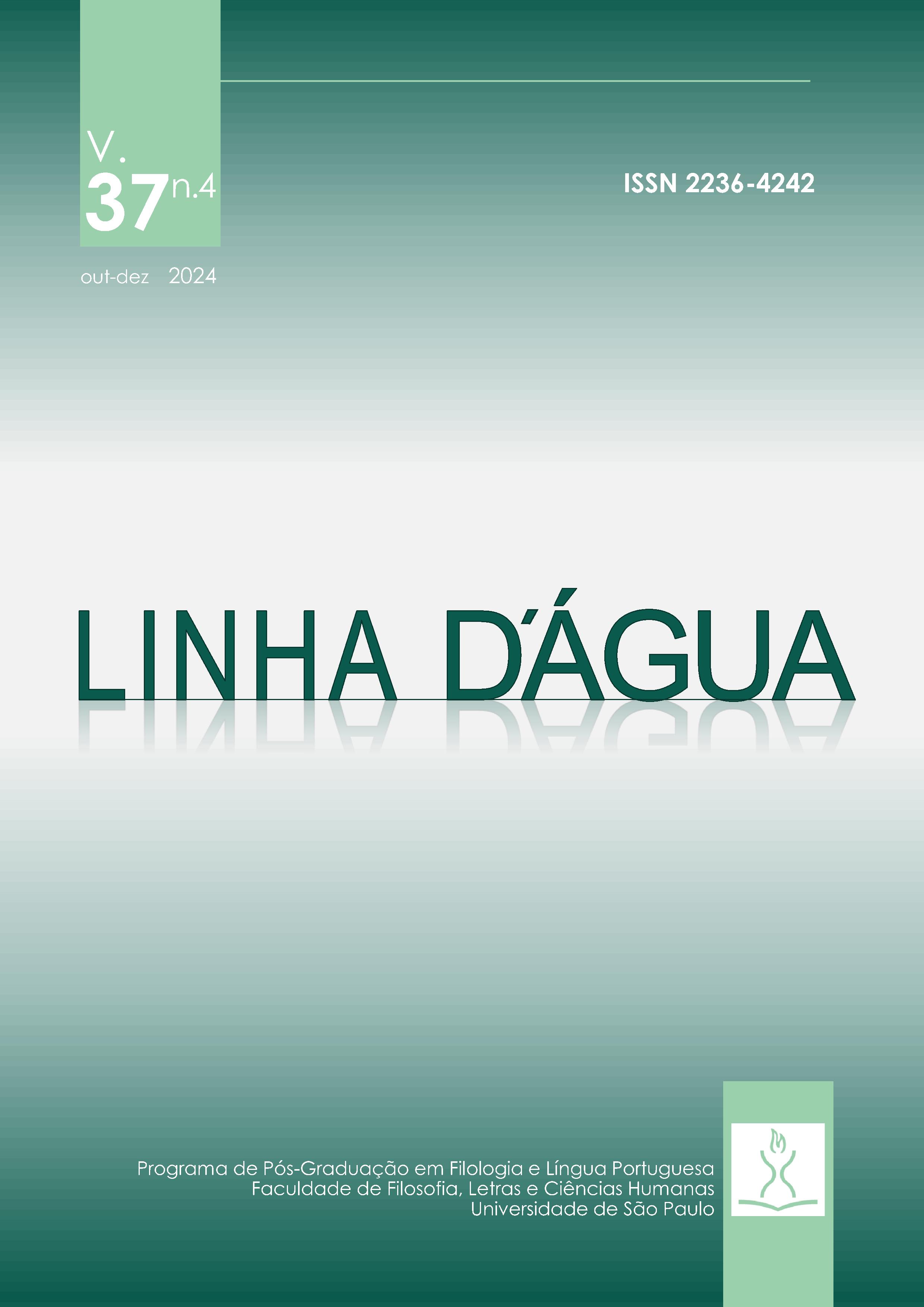Feminine writing in the epistolary tradition in Carta à rainha louca, by Maria Valéria Rezende
DOI:
https://doi.org/10.11606/issn.2236-4242.v37i4p314-332Keywords:
Epistolary writing, Female authorship, Identity, Carta à rainha louca, Contemporary Brazilian LiteratureAbstract
The present study aimed to examine how the character of a writer is constructed in the novel Carta à rainha louca (2019) by Maria Valéria Rezende, revisiting the issues surrounding epistolary writing by women. Thus, it sought to trace a path concerning the mentioned genre and how letters were attributed a feminine character, leading to questions about their relationship with women’s identity over time, as well as discussing themes around epistolary novel, such as characters and readers. Methodologically, this study is characterized as bibliographic research, drawing on theoretical contributions from authors such as Haroche-Bouzinac (2016), Diaz (2016), Bouvet (2006), Castells (2018), Perrot (2017), among others. The results indicate that this type of study provides an opportunity for reflection on how women are represented and how they express their voices through writing.
Downloads
References
ALEXANDRE JÚNIOR, M. Argumentação retórica na literatura epistolar da Antiguidade. EID&A – Revista Eletrônica de Estudos Integrados em Discurso e Argumentação, Ilhéus, n. 8, p. 166-187, jun., 2015.
BOUVET, N. E. La escritura epistolar. Buenos Aires: Eudeba, 2006.
CASTELLS, M. O poder da identidade. Tradução: Klauss Brandini Gerhardt. 9. ed. São Paulo: Paz e Terra, 2018.
CORDEIRO, L. Sóror Mariana: a freira portugueza. Lisboa: Ferin e Cia, 1890.
DEL PRIORE, M. D. Maria I: as perdas e as glórias da rainha que entrou para a história como “a louca”. São Paulo: Benvirá, 2019.
DIAZ, B. Correspondência e escrita de si. In: DIAZ, B. O gênero epistolar ou o pensamento nômade: formas e funções da correspondência em alguns percursos de escritores do século XIX. Tradução: Brigitte Hervot e Sandra Ferreira. São Paulo: EDUSP, 2016. p. 141-196.
DIAZ, B. Gênero epistolar e identidade feminina. In: DIAZ, B. O gênero epistolar ou o pensamento nômade: formas e funções da correspondência em alguns percursos de escritores do século XIX. Tradução: Brigitte Hervot e Sandra Ferreira. São Paulo: EDUSP, 2016. p. 197-225.
FERREIRA, J. G. Flores azuis: uma desconstrução do romance epistolar. Pós-Limiar, Campinas. v. 2, n. 2, p. 171-178, jul./dez., 2019.
FOUCAULT, M. A escrita de si. In: FOUCAULT, M. Ética, sexualidade, política. Tradução: Elisa Monteiro e Inês Autran Dourado Barbosa. Rio de Janeiro: Forense Universitária, 2004. p. 144-162.
GODOY, L. B. Uma carta... um espaço entre dois. Ide, São Paulo. v. 33, n. 50, p. 36-53, jul., 2010.
HAROCHE-BOUZINAC, G. Escritas epistolares. Tradução: Ligia Fonseca Ferreira. São Paulo: EDUSP, 2016.
LINHARES, V. L. Escrever e rasurar, rasurar e escrever: considerações sobre a metanarratividade na escrita de Carta à rainha louca, de Maria Valéria Rezende. Em Tese, Belo Horizonte. v. 26, n. 2, p. 79-94, maio/ago., 2020.
MUHANA, A. F. O gênero epistolar: diálogo per absentiam. Discurso, v. 31, p. 329-345, 2000.
PERROT, M. Minha história das mulheres. 2. ed. São Paulo: Contexto, 2017.
REZENDE, M. V. Carta à rainha louca. Rio de Janeiro: Alfaguara, 2019.
WITZEL, D. G.; TEIXEIRA, N. C. R. B. Discurso e memória de uma mulher desobediente em Carta à rainha louca. Interfaces, v. 11, n. 4, p. 246-258, 2020.
Downloads
Published
Issue
Section
License
Copyright (c) 2024 Cindy Conceição Oliveira Costa

This work is licensed under a Creative Commons Attribution-NonCommercial 4.0 International License.
The Editorial Board authorizes free access to and distribution of published contentes, provided that the source is cited, that is, granding credit to the authors and Linha D'Água and preserving the full text. The author is allowed to place the final version (postprint / editor’s PDF) in an institutional/thematic repositor or personal page (site, blog), immediately after publication, provided that it is available for open access and comes without any embargo period. Full reference should be made to the first publication in Linha D'Água. Access to the paper should at least be aligned with the access the journal offers.
As a legal entity, the University of São Paulo at Ribeirão Preto School of Philosophy, Sciences and Languages owns and holds the copyright deriving from the publication. To use the papers, Paidéia adopts the Creative Commons Licence, CC BY-NC non-commercial attribution. This licence permits access, download, print, share, reuse and distribution of papers, provided that this is for non-commercial use and that the source is cited, giving due authorship credit to Linha D'Água. In these cases, neither authors nor editors need any permission.
Partial reproduction of other publications
Citations of more than 500 words, reproductions of one or more figures, tables or other illustrions should be accompanied by written permission from the copyright owner of the original work with a view to reproduction in Linha D'Água. This permission has to be addressed to the author of the submitted manuscript. Secondarily obtained rights will not be transferred under any circumstance.
How to Cite
Funding data
-
Coordenação de Aperfeiçoamento de Pessoal de Nível Superior
Grant numbers 88887.908351/2023-00










